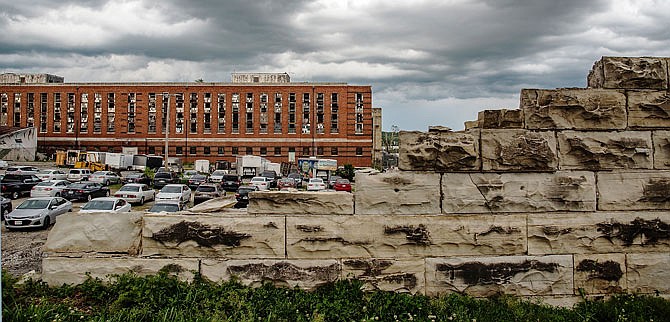The Jefferson City Council approved a developer performance agreement for the Missouri State Penitentiary redevelopment site Monday.
The agreement details what the Missouri State Penitentiary Community Partners wants to see in developers' proposals for the city's 31.28-acre redevelopment project. The site is between the historic site and Chestnut Street, including some right-of-way areas and the old prison shoe factory.
There are four possible development teams, selected by MSPCP, who can submit MSP redevelopment project proposals. The development teams are:
- Americo Life, Burns & McDonnel, and Kit Bond Strategies.
- Jefferson City Vision Partners, made up of Obrascon Huarte Lain S.A., Development Strategies, Killian Construction Company, CFS Engineers, SFS Architecture, hdesigngroup and Hoerr Schaudt.
- Chesterfield Hotels, Arcturis, Peckham Architecture and Central Missouri Professional Services.
- Farmer Companies.
The city will sign agreements with each team, and developers will have until Dec. 1 to submit their MSP redevelopment project proposals.
The MSPCP will review the proposals before selecting a developer. The city anticipates selecting a developer by next spring, city officials previously said.
The city must select a developer within two years of the state conveying the land to the city, according to an agreement between the city and state. The city must also start construction within four years, the agreement adds.
The state conveyed nearly 32 acres of the old prison to Jefferson City in the summer of 2017. The state and city finalized the conveyance more than a year ago.
One section of the developer performance agreement asks developers to propose plans for a convention center, which should be at least 50,000 or more square feet total, according to the agreement.
The proposals should include for vehicular connections, the existing walls, integration of the gas chamber in the development, and rehabilitation of the old prison shoe factory, according to the agreement. The project proposals should also include project data, estimated cost, financial feasibility and implementation timeframe.
The MSPCP agreed to pay a stipend of $10,000 to each developer who submits a redevelopment proposal that satisfies the developer's obligations under the draft agreement.
According to an agreement between the city and state, primary proposed uses for the site include hotels, entertainment venues, office buildings, museums and convention centers, according to the agreement between the city and state. Developers could also construct secondary uses such as full-service and fast-casual restaurants, bars, coffee shops and retail establishments, as long as these features do not exceed 10,000 square feet each.
Developers could also build parking structures, green spaces and pedestrian plazas on the site.
Traditional fast-food restaurants, retail or restaurant establishments with drive-thru facilities, an enclosed shopping mall, and other residential uses other than condominium units and loft-style apartments are not permitted, according to the agreement.
All structures and improvements must be of a similar style to the existing MSP historic structures, according to the agreement.
The May 22 tornado damaged the old shoe factory, and the Missouri Office of Administration estimates it would cost $433,400 to repair and/or replace it.
While the gas chamber is located on the redevelopment site, the state will retain ownership of it, along with other historic buildings used during the Jefferson City Convention and Visitors Bureau's prison tours.
After suggesting some minor changes, the MSPCP recommended approval of the agreement earlier this month.
In other business Monday, the City Council heard a bill that would allow exempt city staff who work over their salary hours to receive compensation time or their additional hourly rate when the president declares a state or emergency and when the Emergency Operations Center is activated and staffed.
Under city code, exempt employees are typically not paid for hours worked beyond 40 hours per week.
Several city employees worked overtime during recent natural disasters and cleanup but no additional pay or compensation was given to exempt employees, Human Resources Department Director Gail Strope said.
The city is currently calculating the total number of hours worked by each department during the tornado and flooding, Jefferson City Finance Director Margie Mueller previously said.
If the policy were implemented, Strope previously said, the Federal Emergency Management Agency and State Emergency Management Agency could reimburse those funds to the city.
The Jefferson City Council Committee on Administration recommended the personnel policy change last week.
In other business Monday, the City Council also approved a $79,512 construction contract with Meyer Electric Company Inc. to replace lighting and electrical infrastructure that was damaged during the tornado.
Meyer Electric Company will replace damaged infrastructure at the Lorenzo Greene Drive and Ellis Boulevard intersection, as well as in the 400 blocks of Miller, East McCarty and Jackson streets, the 500 and 600 blocks of East Capitol Avenue, and the 100 block of Lafayette Street.
Also on Monday, the City Council approved a bill that modifies the 2008 work agreement between the city and the Jefferson City Professional Firefighters Local 671 to allow the firefighters to implement the 48.5-hour shift.
Local 671 plans to begin its one-year trial period on Jan. 4, 2020.
Under the new shift, firefighters would work the 48.5 hours and have 96 straight hours off. The Jefferson City Fire Department currently works 24.25-hour shifts, where firefighters work three days in a five-day span and have four days off.
After that trial, the firefighter union and city administration will decide whether to keep the new shift schedule or revert back to 24.25-hour shifts, union representatives previously said.
To remain budget-neutral, Fire Chief Matt Schofield had recommended amending the agreement so the duty cycle is 24 consecutive days instead of 27 days. Sleep exclusion would also be 35.75 hours instead of 38 hours.

